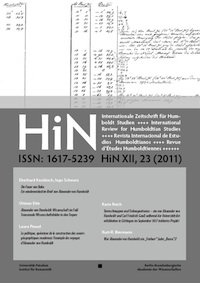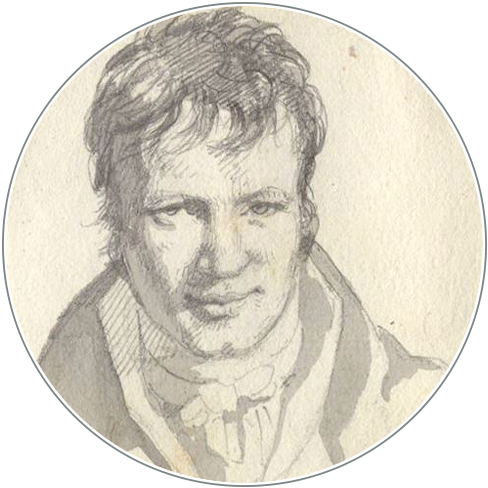Le politique, opérateur de la construction des savoirs géographiques modernes: l'exemple des voyages d'Alexander von Humboldt
DOI:
https://doi.org/10.18443/159Palabras clave:
Amerika-Reise, BBAW, Epistemologie der Geographie, Geographie, Humboldtian Science, ReisenResumen
Résumé
A la charnière du XVIIIème et du XIXème siècle, Alexander von Humboldt réalise une série de voyages scientifiques et géographiques en Europe, en Amérique et en Asie. Connus en grande partie par sa très riche correspondance, ces voyages sont tous marqués par la présence et l’intervention d’acteurs du monde politique européen. Par leur soutien financier, matériel et moral, ainsi que par leur délimitation spatiale, temporelle voire thématique des objets des expéditions, ceux-ci structurent pratiquement et intellectuellement le déroulement des expéditions humboldtiennes. Aux alentours du moment 1800, la géographie se trouve alors engagée dans un mouvement de construction disciplinaire, questionnant ses objets, ses méthodes et ses pratiques. Inséré dans ce processus, le voyage constitue un enjeu identitaire fort de l’élaboration et de la définition des savoirs géographiques modernes. La participation des acteurs politiques dans les voyages interroge leur rôle d’opérateurs de la fabrique scientifique. A partir de l’exemple humboldtien, dans une optique d’histoire et d’épistémologie de la géographie, cet article propose d’engager une analyse relationnelle du couple géographie/politique.
Zusammenfassung
Zwischen 1799 und 1829 unternahm Alexander von Humboldt eine Reihe wissenschaftlicher Reisen durch Europa, Amerika und Asien. Nicht zuletzt dank der überlieferten Korrespondenz sind die Reisen sehr gut dokumentiert: Politische Akteure spielten eine große Rolle bei der Planung und Umsetzung der Reisen. So unterstützten sie Humboldts Reisen sowohl mit materiellen als auch ideellen Mitteln. Mitunter nahmen sie Einfluss auf Routen sowie auf Dauer und thematische Ausrichtung der Reisen. Dies strukturierte die Humboldt’schen Reisen intellektuell und in ihrer praktischen Umsetzung. Um 1800 bildete sich die Geographie zur wissenschaftlichen Disziplin heraus, ihre Forschungsgegenstände, Methoden und Praktiken wurden überprüft. Bei der Herausarbeitung und Definition des modernen geographischen Wissens stellte die Forschungsreise eine große Herausforderung dar. Welche Rolle spielten die politischen Akteure in diesem Prozess? Was war ihr Anteil an der Produktion wissenschaftlichen Wissens? Am Beispiel Humboldts untersucht der Artikel das Beziehungspaar Geographie und Politik aus dem Blickwinkel der Geschichte und Epistemologie der Geographie.
Abstract
Between 1799 and 1829 Alexander von Humboldt travelled through Europe, America and Asia. These voyages are well documented in the extensive body of his correspondences, which give evidence of the strong political influence on his scientific journeys. Through their financial, material and moral support, political actors had an enormous impact on Humboldt’s travels on practical and intellectual levels alike. At the beginning of the nineteenth century, the science of geography was in a process of renewal as its objects, methods and procedures were being reconsidered. In this disciplinary reconstruction, scientific journeys played an increasingly significant role, and give rise to the following questions: What role did political actors play in this process of redefining a discipline? How did they contribute to the production of scientific knowledge? Following an historical and epistemological approach of geography and using the example of Alexander von Humboldt, this paper analyses the relationship between politics and geography.
Cómo citar
Número
Sección
Licencia
Derechos de autor 2011 Laura Péaud

Esta obra está bajo una licencia internacional Creative Commons Atribución-NoComercial 4.0.
Los derechos de los artículos enviados permanecen en manos de los/as autores/as y se publican bajo una licencia CC (CC BY-NC 4.0). Todos los/as autores/as que publican en HiN aceptan este modelo de licencias.
Es responsabilidad de los/as autores/as obtener la autorización necesaria para la publicación de imágenes.
Los derechos del Diseño de Impresión y el diseño de la revista no son transferibles y no pueden reutilizarse de ningún modo para otras publicaciones sin previa aprobación de HiN.









